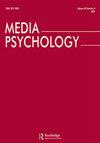Media as A Source of Coping and Social, Psychological and Hedonic Well-being: A Longitudinal Qualitative Study during the COVID-19 Pandemic
IF 2.6
2区 心理学
Q1 COMMUNICATION
引用次数: 1
Abstract
ABSTRACT The COVID-19 pandemic and lockdowns have provided an unprecedented opportunity to better understand the processes by which media are used to improve coping and impaired well-being. Despite the important health issues at stake, the overall dynamic of media-based coping strategies (MBCS), their evolution over time according to their perceived efficacy, and their link with social well-being are poorly understood. The present longitudinal qualitative study, conducted in seven phases of interviews over a period of 36 weeks among a diverse population experiencing lockdown, lifting of lockdown, and then a second lockdown (N = 31; total duration 192 hours), shows how individuals implemented eight families of MBCS on two interdependent levels. On the first level, two families of MBCS developed “micro” and “macro” social processes, contributing to social well-being. Social media satisfied social needs usually satisfied offline. Two other families also improved psychological and hedonic well-being. Among these MBCS, the hedonic strategies in particular were perceived as being ineffective after about a month of confinement. Four families of second-level MBCS were then implemented and were perceived as effective in both the short and long term. Limitations and new perspectives opened by the results are discussed.媒体作为应对和社会、心理和享乐幸福的来源:COVID-19大流行期间的纵向定性研究
2019冠状病毒病大流行和封锁为更好地了解媒体用于改善应对和受损福祉的过程提供了前所未有的机会。尽管存在重要的健康问题,但基于媒体的应对策略(MBCS)的总体动态、它们根据其感知效力随时间的演变以及它们与社会福祉的联系却知之甚少。本纵向定性研究在为期36周的时间里,在经历封锁、解除封锁和第二次封锁的不同人群中进行了七个阶段的访谈(N = 31;总持续时间192小时),展示了个人如何在两个相互依存的层面上实施8个MBCS家庭。在第一个层面上,MBCS的两个家庭发展了“微观”和“宏观”社会过程,对社会福祉做出了贡献。社交媒体通常满足线下的社交需求。另外两个家庭的心理和享乐幸福感也有所改善。在这些MBCS中,享乐策略在大约一个月后被认为是无效的。然后实施四个二级MBCS家庭,并被认为在短期和长期都有效。讨论了研究结果的局限性和新视角。
本文章由计算机程序翻译,如有差异,请以英文原文为准。
求助全文
约1分钟内获得全文
求助全文
来源期刊

Media Psychology
Multiple-
CiteScore
8.60
自引率
7.10%
发文量
30
期刊介绍:
Media Psychology is an interdisciplinary journal devoted to publishing theoretically-oriented empirical research that is at the intersection of psychology and media communication. These topics include media uses, processes, and effects. Such research is already well represented in mainstream journals in psychology and communication, but its publication is dispersed across many sources. Therefore, scholars working on common issues and problems in various disciplines often cannot fully utilize the contributions of kindred spirits in cognate disciplines.
 求助内容:
求助内容: 应助结果提醒方式:
应助结果提醒方式:


